I see at least the following options (order by increase efficiency):
Just the readable Pythonic Way
One nice thing about python is that you can write these expressions in very close analogy to the way it is written in math. In your case, you want to sum over an iterable of numbers:
f = sum(
3 * gamma * H[i] * (
R + (
sum(
H[j] * np.tan(alpha[j])
for j in range(i+1)
)
)
)**2
for i in range(n)
)
Caching the Inner Sum
In your case, the inner sum
sum(
H[j] * np.tan(alpha[j])
for j in range(i+1)
)
is calculated multiple times, while it just increments in every iteration. Let's just call this term inner_sum(index). Then inner_sum(index-1) has already been calculated in the previous iteration. So we loose time when we recalculate it in every iteration. One approach could be to make inner_sum a function and cache its previous results. We could use functools.cache for that purpose:
from functools import cache
@cache
def inner_sum(index: int) -> float:
if not index:
return H[0] * np.tan(alpha[0])
return inner_sum(H, index - 1) + H[index] * np.tan(alpha[index])
Now, we can just write:
f = sum(
3 * gamma * H[i] * (
R + inner_sum(i)
)**2
for i in range(n)
)
Using a Generator for the Partial Sum
This is still not memory-efficient, because we store all the H[i] for i < index in memory, while we actually just need the last one. There are different ways to implement an object which only stores the last value. You could just store it in a variable inner_sum_previous, for example. Or you could make inner_sum a proper generator spitting out (in fact: yielding) the partial sums one after another:
from typing import Generator
def partial_sum() -> Generator[float, None, None]:
partsum = 0
index = 0
while True:
try:
partsum += H[index] * np.tan(alpha[index])
yield partsum
index += 1
except IndexError:
raise StopIteration
With this, we would write;
partial_sum_generator = partial_sum()
f = sum(
3 * gamma * H[i] * (
R + next(partial_sum_generator)
)**2
for i in range(n)
)
